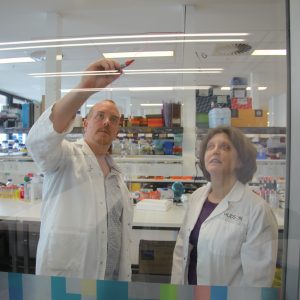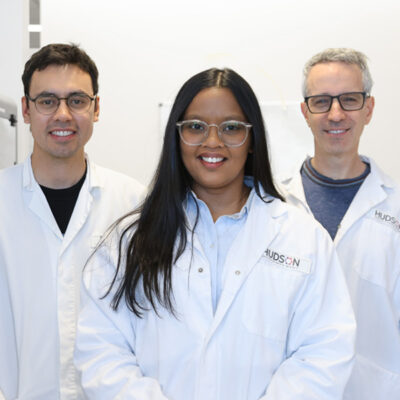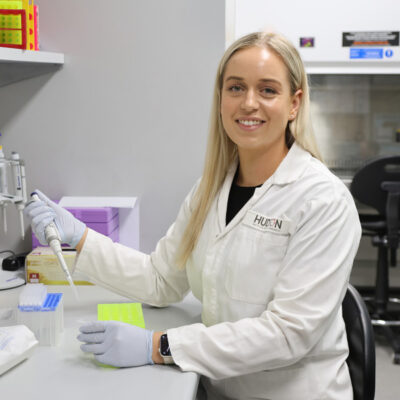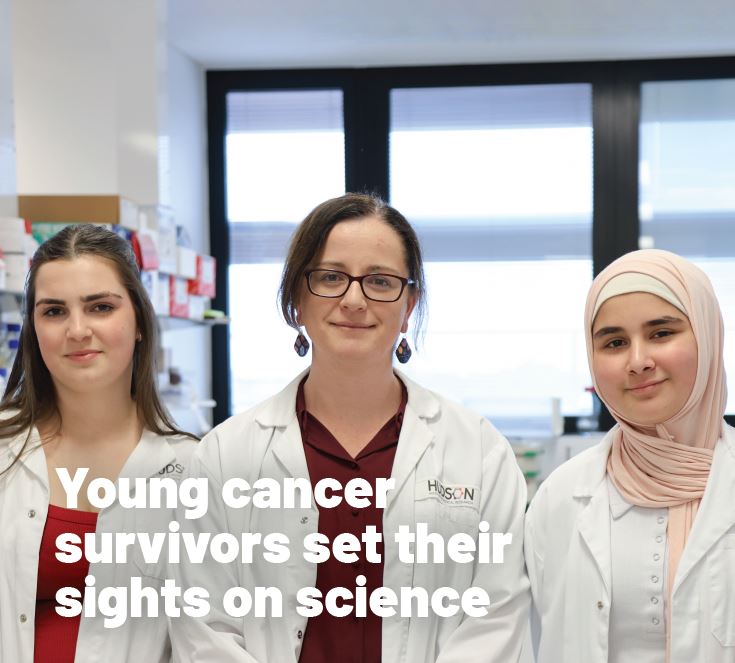Shedding light on the male bias in childhood brain tumours
By Hudson Institute communications
Hudson Institute researchers discover why the most common form of childhood brain cancer is seen in boys more than girls, and identify a potential biomarker for less aggressive treatment.
Medulloblastoma (MB) is the most common brain tumour in children, accounting for 20 percent of all childhood brain tumours. It affects the cerebellum—the area at the back and bottom of the brain—yet the tumours can often spread to other parts of the brain and to the spinal cord.
MB most frequently occurs between the ages of three and eight, and develops more commonly in boys than girls (a ratio of roughly 1.5 to 1)—a feature that is well-recognised, yet poorly understood. Boys are not only more likely to develop MB, but are also less likely to survive, in comparison to girls.
Discovering the reason behind this difference could open up the possibility of targeted or less aggressive treatments, and this formed the basis of a study published in Cancers, led by Hudson Institute researchers Dr Daniel Gough and Dr Christine White.
The role of STAT3
The researchers investigated the role of STAT3 in MB—a protein which is over-expressed in the majority of adult cancers. Despite its well-known involvement in these cancers, little is known about its role in MB. The team used both pre-clinical models and previous patient data to determine whether the protein played any part in the condition’s male bias, or sexual dimorphism.

“The results from our study suggest that STAT3 could be used as a biomarker to predict patients with good prognosis who would benefit from less aggressive treatment regimens, or that inhibiting STAT3 itself will be an effective new targeted therapy for the treatment of medulloblastoma” said Dr Gough.
Targeting STAT3 in pre-clinical models completely protected males from developing a tumour—but intriguingly, not females. In addition, in analysis of existing patient data, it was found that individuals with low STAT3 expression had an improved survival rate in comparison to those with high STAT3 expression.
The team also discovered that interleukin-6 (IL-6)—a potent activator of STAT3—is expressed more in males than in females— and acts to increase the transcription of genes associated with MB.
Not only do these results suggest an explanation for the male bias seen in MB, they also indicate that targeting STAT3 will significantly benefit male patients.
New hope for treatment
Currently, treatment begins with surgery (to remove as much of the tumour as possible), followed by radiotherapy and chemotherapy. This treatment approach has improved overall survival to nearly 80 percent, however such aggressive therapy on a young child’s growing brain can have lifelong consequences.
The majority of MB survivors aren’t able to finish regular primary school due to very severe neurological, cognitive and developmental side effects, with more than 90 percent need long-term special education services.
Less aggressive treatment for low risk patients with low STAT3 expression—or ideally in the future, a STAT3-targeted therapy for all male MB patients—would mean fewer side effects and a greater quality of life for these children.
These exciting insights will feed into the Hudson Monash Paediatric Precision Medicine Program—a research initiative established with investment from the Children’s Cancer Foundation. The initiative focuses on developing targeted treatments and improving clinical outcomes, survival rates and quality of life for childhood cancer patients, particularly those with brain cancer and solid tumours.
Collaborators | Jason Cain, Hudson Institute of Medical Research; Neil Watkins, Cancer Care Manitoba; Marc Remke and Daniel Picard, German Cancer Research Center
Funders | Victorian Cancer Agency, NHMRC Career Development, Children’s Cancer Foundation
In this article
About Hudson Institute
Hudson Institute’ s research programs deliver in three areas of medical need – inflammation, cancer, women’s and newborn health. More
Hudson News
Get the inside view on discoveries and patient stories
“Thank you Hudson Institute researchers. Your work brings such hope to all women with ovarian cancer knowing that potentially women in the future won't have to go through what we have!”







